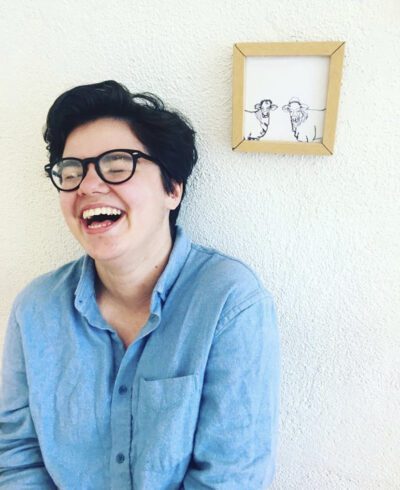The concept of the future is such a thorny, impossible construct to grasp fully. As much as someone prepares for what they think it holds, the future has a way of turning absolutes into indefinites. Such is the case in the aptly named The Future. Nurit (Reymonde Amsellem) is a researcher and profiler who works with the Israeli government. She has created an algorithm that effectively removes the uncertainty about the future by identifying people who will commit terrorist attacks. There was an error in her algorithm and a young woman, Yafa (Samar Qupty), assassinates the minister of Space and Tourism. The bulk of the film is conversations between these two women about each other’s lives that have irreparable effects on their futures.
Further adding to the complexity is the past lives of both characters. Nurit is Israeli and Yafa is Palestinian. The conflict and friction between these two cultures dates back to the end of the 19th century, but the end of World War II brought new violence to the region that is continuing to this day. The Future takes this conflict and locks it in a room. This large-scale, decades-spanning political debate is personified by Nurit and Yafa. They are put in a room together, locked in, and forced to talk about the clash of their cultures in the context of Nurit’s failed algorithm and Yafa’s assassination.
The film’s title refers to a multitude of themes at play, but perhaps the strongest personification of the title is the response to the Israeli-Palestinian Conflict. The Future asks the audience to think about what world they want to build for their children. It’s something that Nurit is consumed with. In between her meetings with Yafa, Nurit is visiting doctors and a potential surrogate (Dar Zuzovsky) in her journey to become a mother. She’s 42 and is struggling to conceive, but has not given up her dream of being a mother. Nurit likely created the algorithm to create a safer future for the child she wants to have. The advertisement for the program muses “imagine a world without violence. A world without flaws. A flawless world.” Flawless by whose definition?
The algorithm Nurit has created also poses the question of how much access should governments have to personal data to prevent something horrible from happening. Not just public posts and comments, but surveillance cameras, listening in on phone calls, reading text messages. Should we be asked to give up our freedom to prevent domestic terror attacks from happening? Is this how artificial intelligence is best used? What part of a person’s digital footprint is theirs and theirs alone? These thorny questions are what society must reckon with as our lives and our technology continue to morph into one another.
The Future also touches on the idea of nature versus nurture in the case of Yafa. Nurit assures Yafa that she’ll be questioning her mother because the environment Yafa grew up in must have had some sort of impact on the person she is today. Of course a person’s past has an effect on who they grow up to be and it’s surely on Nurit’s mind as she takes steps to becoming a mother as her relationship with her own mother gets worse. There is simply so much more that goes into a person’s belief system.
With a slim 75-minute runtime, The Future feels a tad underbaked. What the filmmakers are attempting to achieve needs more time to develop simply because there is so much that could be said about these women and their lives. But perhaps that’s asking too much of a film. To, on its own, solve a conflict that began long before the filmmaker and everyone involved with the film was born is an impossible feat. The concept of these two women with starkly different worldviews being forced to listen and communicate with one another would have remained compelling for another half an hour. The Future is a restrained, meditative look at the idea of hope, parenthood, conflict, and the unknowable fear about what lies ahead.




